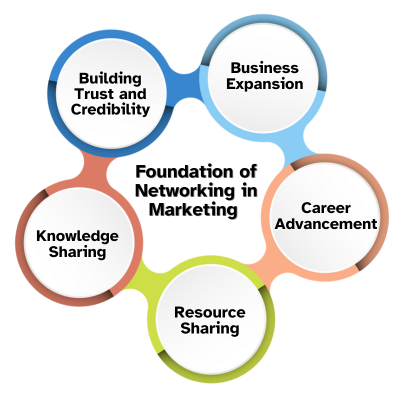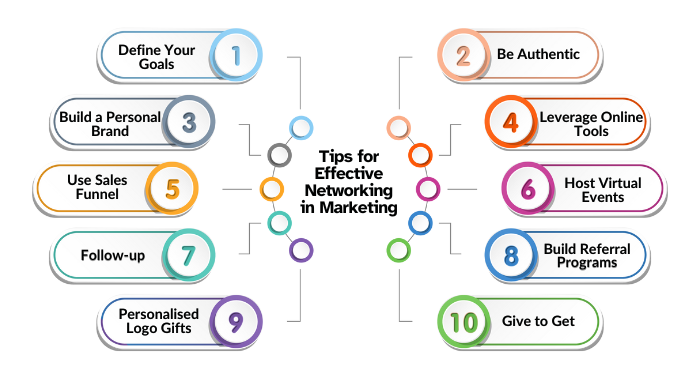In the ever-changing world of marketing, one thing that remains constant is networking. Networking is crucial for marketing success. Marketing is all about making real connections that lead to successful marketing. This article will make it simple for you to understand networking in marketing, the foundation of networking, networking in the digital age, and tips for effective networking in marketing.
Comparison of Networking in Marketing and Network Marketing
Before we get into the nitty-gritty, let’s talk about something both networking in marketing and network marketing have in common: making connections. They both rely on building relationships and tapping into the network of people. But here’s the interesting part – they do it in different ways. Let’s look at how network marketing and marketing use networking to achieve their goals. So, let’s dive in and understand how they each make the most of networking.
What is Networking in Marketing?
Networking is all about building connections, growing your professional network, sharing insights, and opening doors for personal and career development. There are two types of interactions – online and face-to-face. Both online and face-to-face interactions make it a must-have networking tool for marketers.
What is Network Marketing?
Network marketing, also known as multi-level marketing (MLM), is a business model where individuals promote products or services directly to consumers through a network of distributors. These distributors recruit others into their downline, creating a hierarchical structure where each person earns a commission on sales made by themselves and those they recruit.
| Aspect | Networking in Marketing | Network Marketing |
|---|---|---|
| Strategy | Building professional relationships and connections | Direct selling through a distribution network |
| Focus | The primary focus of networking in marketing is on building a strong professional network of contacts, including peers, mentors, industry experts, and potential clients or partners. | The primary focus of network marketing is on selling a specific product or service. Distributors are often encouraged to build large networks and recruit new members to increase their earning potential. |
| Compensation | Networking in marketing does not involve direct monetary compensation for connecting with others. Instead, the rewards come in the form of knowledge exchange, career growth, and business opportunities. | Distributors in network marketing receive commissions not only for their own sales but also for the sales generated by their recruits. This tiered compensation structure is a hallmark of network marketing. |
| Goals | The goals of networking in marketing include staying updated on industry trends, gaining insights from experienced professionals, finding potential partners for joint ventures, and advancing one’s career or business through meaningful connections. | The ultimate goal in network marketing is to create a sustainable income stream by growing a network of distributors and increasing product sales within that network. |
| Examples | Attending industry conferences, joining professional organizations, engaging on social media, and participating in networking events are all examples of activities associated with networking in marketing. | Companies like Amway, Herbalife, and Avon are well-known examples of network marketing businesses. |
In essence, network marketing is a specific business model centred around selling products or services through a hierarchical distribution network, with a focus on recruiting and earning commissions. On the other hand, networking in marketing is a broader strategy aimed at building valuable relationships and connections within the industry to enhance one’s knowledge, opportunities, and career growth.
Impact of Networking in Marketing
As marketing continually adapts to changing consumer behaviours and technologies, an understanding of the impact of networking becomes essential for building successful campaigns and lasting connections. Below are some of the pillars that lay the foundation of networking in marketing.

1. Building trust and credibility
Building credibility and trust within your sector begins with networking. Making important connections helps you build a name for yourself as an expert who is competent and trustworthy. This in turn might improve the reputation of your business’s image and draw in new customers or business partners.
2. Knowledge sharing
Networking gives people a place to discuss trends, best practices, innovative solutions and ideas. You can stay current on the most recent advances by interacting with others in your field, which is important in the quick-paced world of marketing. By sharing best practices, professionals can learn from one another’s successes and avoid common pitfalls, leading to more effective marketing campaigns.
3. Resource Sharing
It makes room for sharing resources possible. Whether working on projects together, using new tools, or using someone’s knowledge – networking can enable you to gain access to useful resources that increase your marketing efforts. It is not just about giving and receiving; it’s about creating a mutually beneficial ecosystem where marketers, businesses, and professionals can thrive.
4. Career Advancement
Networking can catalyze job advancement. Connecting with others in your professional network is an excellent way to increase the chances of getting job opportunities, promotions, and mentorships. At the end of the day, you build a robust professional network and continuously expand one’s skill set.
5. Business Expansion
Networking can help business owners and entrepreneurs make new clients and potential partnerships that can help them enter new markets or reach untapped customer segments. It also facilitates funding for expansion projects, whether through loans, investments, or crowdfunding campaigns.
Common Ways to Build Relationships in the Digital Age
In this digital age, everything has become available worldwide and is accessible to everyone. Networking, once confined to physical meetings and handshakes, now extends its reach across the vast landscape of the internet. Social media and online platforms have developed into essential tools for marketers looking to interact with a worldwide audience. This is how you can build relationships:
1. Use LinkedIn
LinkedIn is the go-to platform for professional networking. It allows marketers to connect with peers, showcase their expertise through articles and posts, and join industry-specific groups.
2. Other Social Media Platforms
Businesses can connect with a broader audience through social networking sites including LinkedIn, Twitter, Facebook, and Instagram. These platforms are particularly useful for building a personal brand and engaging with potential clients.
3. Online communities
Online forums, discussion boards, and communities focused on marketing topics offer a space for marketers to exchange ideas, seek advice, and collaborate on projects.
4. Virtual Events
Virtual events like webinars and online conferences have made it easier for businesses to connect with industry leaders and experts from around the world, all from the comfort of their office or home.
5. Personalize Your Outreach Campaign
When reaching out to potential connections, avoid generic messages. Personalize your invitations or messages by referencing shared interests or common connections. Explain why you want to connect and how you believe the relationship could be mutually beneficial.
6. Foster Meaningful Conversations and provide value
Once connected, initiate meaningful conversations. Ask open-ended questions, show genuine interest in the other person’s work or hobbies, and actively listen to their responses and add value through your conversation. The goal is to establish a rapport based on trust and shared interests.
Tips for Effective Networking in Marketing

Now that we understand the significance of networking in marketing, let’s explore some practical tips to maximize its impact on your career and business:
1. Define your goals
Before you start your networking journey, clarify your objectives. Having clear goals will guide your networking efforts regarding expanding your client base, gaining knowledge, or finding a mentor.
2. Be authentic
Authenticity is key to building meaningful connections. You can be authentic by being yourself. Additionally, share your experiences with the people in your network. When it comes to forming connections, you’re more inclined to bond with genuine individuals rather than those who seem overly rehearsed or insincere.
3. Build a personal brand
Your brand is an important aspect of networking. Showcase your expertise through thought leadership articles, presentations, and social media content. A strong personal brand can attract opportunities and connections.
4. Leverage online tools
Use online platforms strategically. Optimize your LinkedIn profile, engage in relevant discussions, and share valuable content. To get more visibility, use hashtags and keywords.
5. Use Sales Funnel
Effective networking at each stage in the sales funnel involves expanding your network, sharing valuable content, establishing trust, and providing personalized engagement to guide prospects through the funnel. By leveraging your network to create awareness, foster interest, influence decisions, and encourage actions, you not only increase conversions but also cultivate loyal advocates who contribute to sustained business growth.
6. Host virtual events
Virtual events can benefit businesses by reducing costs associated with physical gatherings and expanding their audience reach, enabling global participation. Additionally, they provide a scalable platform for networking, lead generation, and brand exposure, fostering business growth and industry influence
7. Follow-up
Making connections with others is not enough – you will need to follow up by sending a text message or email to express your interest in sustaining the relationship or to address concerns or inquiries. A well-executed follow-up strategy can lead to increased sales, referrals, and a positive reputation in the market.
8. Build Referral Programs
These programs harness the power of word-of-mouth marketing, leveraging the trust and recommendations of satisfied customers to drive customer acquisition and brand loyalty, making them a valuable growth tool. Successful referral programs are built on positive customer experiences and mutual benefits for referrers and referrals.
9. Personalised Logo Gifts
Personalized logo gifts from Your Brand act as a persistent brand reminder, reinforcing your presence in recipients’ minds while also extending your brand’s reach through word-of-mouth and discussions, indirectly captivating a broader audience.
10. Give to get
Be generous in supporting individuals in your network by giving them insights that you have learned. Don’t expect anything in return – Generosity often leads to reciprocation. By consistently delivering high-quality products or services, offering expertise, and addressing customer needs, businesses establish trust and loyalty. This trust leads to customer retention, positive referrals, and long-term relationships.
Networking is like the secret sauce of marketing success. Whether you’re a pro marketer or just starting out, the people you connect with can really boost your career and business. In a world where relationships and connections are super important, spending time on networking isn’t a choice; it’s a must-do. It’s what keeps marketing working well in a world that’s always changing.



